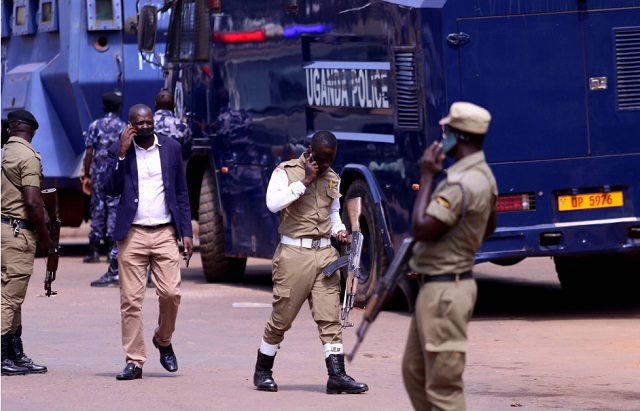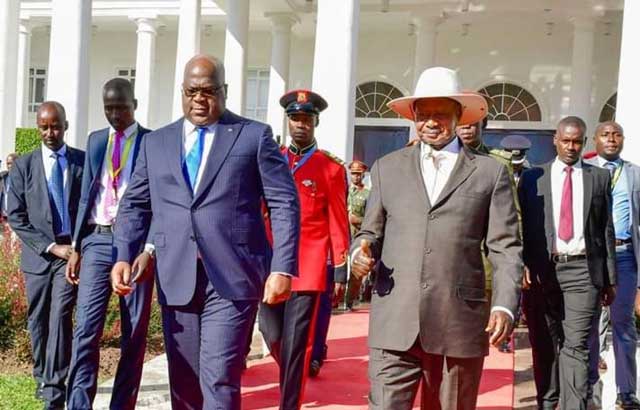
Twin bomb blasts in city centre leave country on edge
Kampala, Uganda | IAN KATUSIIME | Where does the nation go from here? Many seemed to ask. Two bomb blasts in the heart of Kampala brought back the sad memories of the 2010 bomb attacks that killed 76 Ugandans enjoying the city’s renowned night life. In the last three weeks since an explosion rocked a pork joint in Komamboga, a Kampala suburb, the country has been vulnerable with a set of explosions targeting different areas, injuring and killing Ugandans.
The bombs that exploded on the morning of Nov. 16 claiming six lives and injuring more than 30 just outside the Central Police Station and a few metres from Parliament have been cited as a game changer for the country’s security on how they raise alert levels and their preparedness for the next attack. Kampala and major towns in Uganda are rife with bomb scares with Counter Terrorism police officers and the military teeming all over.
A Police briefing three hours after the attack showed the footage of the actual bomb blast- displaying the invisible nature of the threat the country faces. The footage showed the first suspected suicide bomber carrying a backpack walking in front of the Central Police Station and appearing to detonate the bomb sending those nearby scampering for safety and causing widespread damage.
The other footage showed the second suspected suicide bombers riding on boda bodas and detonating the bombs at Parliament Avenue, a busy section in the city centre where various government offices are located. The explosion scraped nearby buildings, set an SUV ablaze and shattered glass in the vicinity. The nearby offices of the ministry of Information Communication Technology (ICT) looked most hit with shards of glass strewn all over.
As expected, President Yoweri Museveni, responding to the incident on Twitter several hours later, linked the suspects to Allied Democratic Forces (ADF), the rebel group accused of several attacks in the city, and named some of them. Police spokesperson Fred Enanga said police chased after one of the suspects in the ensuing manhunt that ended in Bwaise, about 6km from the scene of the attack, where some materials were recovered from the suspect’s house. The latter died as a result of a reported shoot-out.
It appears it is from this suspect’s interrogation before he died that the President named two of the suspected bombers and said they were part of the team of those who shot at Works Minister Edward Katumba in June killing his daughter and driver. However CCTV footage released by Police shows the two bombers riding on boda bodas blowing up to smithereens beyond any possible recognition. The blow up raises doubts on how Police was able to name the suspects just hours later.
In short, Museveni said the country was ready to deal with urban terrorism. An hour after the bomb blasts that ripped through the city centre occurred, another blast was heard and it seemed to be a bomb planted at a power station at a nearby building to the Central Police Station that Police bomb squads intercepted and carefully detonated.
Pictures emerged of a bomb squad detective dressed in heavy green protective gear as he appeared to neutralise the bomb that was placed inside a power plant not very far from where the others exploded.
The bombs went off minutes apart demonstrating a desire by the terrorists to inflict grievous damage in the heart of the city after previous far off targets.
Enanga in a statement a day after the blast said police had gathered some evidence. “Our Joint CT task teams have completed documenting evidence from the inner perimeters at the two blast sites, evidence from the motorcycles used, and body samples for DNA. They also obtained very critical cyber leads and other digital evidence.”
He said the task teams had finished sweeping all buildings surrounding the blast sites and other vital installations, for secondary devices, with the assistance of the canine teams.
The three other people that died from the blasts were identified as Police Constable Amos Kungu, attached to Central Police Station; Ismail Basibe and Christopher Sande, who also died from the spot.
Uganda Police and its sister agencies have been accustomed to investigating killings by hit men on boda bodas and the new wave of terror presents a different ball game for the Counter Terrorism arm led by Assistant Inspector General of Police (AIGP) Abasi Byakagaba.
War on ADF
In the last several months, security agencies have been in an offensive against ADF that has been deemed Uganda’s number one target. Chieftaincy of Military Intelligence (CMI), the Criminal Investigations Directorate (CID) and the Counter Terrorism Directorate, the latter two directorates part of the Police, have all swung into action as an anxious public looks on.

Uganda and Democratic Republic of Congo (DRC) have been in talks this year at various intervals over a possible deployment of Ugandan troops in the eastern part of DRC to flush out ADF which has harboured there for years. In June, President Museveni met his DRC Counterpart Felix Tshisekedi in Kasese over a different matter- commissioning a 223km road project meant to boost trade between the two countries.
Some analysts point out that the meeting and commissioning was part of activities meant to lay the groundwork for deployment of Uganda Peoples Defence Forces (UPDF) troops. Ugandan officials are cagey on details but reports say the two countries have been sharing intelligence on ADF for months.
Two days after the attacks, security operatives raided the home of Sheikh Mohammed Kirevu in Nsangi, Wakiso district and shot him dead. According to his son who spoke to an NTV journalist, the operatives handcuffed Kirevu and shot him dead in his house.
Police and the security establishment have maintained the narrative since the shocking killing, that Kirevu resisted arrest leading to his execution- an assertion that has generated widespread condemnation of a growing number of extra judicial killings in the name of fighting terrorists.
While appearing on NTV talk show On the Spot, David Muhoozi, minister of state for internal affairs, doubled down on the claim when the show host asked why Kirevu was killed even after he was already subdued with handcuffs. “That is your own version. Our version is that he resisted arrest,” Muhoozi said. The minister and former Chief of Defence Forces (CDF) of the UPDF revealed that Kirevu was a known ADF operative who got amnesty years back.
Muhoozi alleged that Sheikh Kirevu had slipped back into old habits by acting as a top recruiter for the ADF. Police spokesperson Enanga said Kirevu was instrumental in running the ADF cell in Kampala which has been cited in the recent explosions and spate of attacks. In his statement on Nov. 18, Enanga said Police is hunting for Sheikh Sulaiman Nsubuga of Kajjansi, who he said was working with Kirevu in recruiting ADF fighters.
By press time, a total of 21 suspects had been arrested from cells in Lweza, Mpererwe, located in Kampala and the districts of Luweero, Bundibugyo and Ntoroko. These included women and children all accused of having ADF links. A number of terror suspects have ended up dead in the last one month of heightened terror threats. Police said four suspected ADF members were shot in Ntoroko, a border district with DRC where the government has been in surveillance against ADF activities.
A police statement said the four were “part of the recruitment and logistical coordination network, in Bundibugyo and Ntoroko Districts.” They reportedly tried to force their way through a checkpoint after being surveilled and intercepted at Kisenge trading centre on the Fort Portal-Bundibugyo Highway.
Another suspect in the Komamboga explosion was shot dead by police after he was said to have jumped off a police patrol vehicle while being escorted to the Special Investigations Unit in Kireka.
Meanwhile police and security agencies have named Muhammad Luminsa as one of the key leaders of ADF responsible for instigating anarchy in Uganda. The four suspected ADF recruits killed in Ntoroko were linked to Luminsa according to Police.
A Police statement named Luminsa as the 5th commander in ADF hierarchy and according to intelligence reports, he previously served as Director of Training and Recruitment. This leaves Luminsa as arguably the highest ranking ADF member on the radar of Ugandan security. A previous document of the ADF hierarchy showed him as 16th from the group leader Jamil Mukulu who was captured in 2015 from Tanzania and now faces several charges in Uganda.
A large number of ADF remnants sought amnesty with the Ugandan government in the mid-2000s after the group was weakened. Therefore the statement by Gen. Muhoozi on Sheikh Kirevu, means ex-ADF combatants who got amnesty are probably being surveilled and there is a thin line between their activities and them being deemed agents of ADF who could face arrest and possible summary execution.
In the early 2010s, the ADF had a resurgence and resumed operations in the Congolese towns of Beni and areas in Uganda near its border with DRC.
A 2014 UN Group of Experts Report on the DRC to the UN Security Council stated “During 2013, ADF grew stronger and became more aggressive, kidnapping dozens of local people, targeting medical facilities, shipments and staff, abducting humanitarian workers and attacking MONUSCO peacekeepers.”
The report also noted that ADF maintains businesses and support networks in the towns of Butembo, Beni and Oicha, in DRC. “These networks consist of businesses that give money and goods to ADF, including taxis (both motorcycles and cars), produce funding for ADF and are involved in small-scale gold mining and in the sale of rights for timber harvesting.”
UPDF maintains a Mountain division in the Rwenzori area to counter the threat posed by ADF in the districts of Ntoroko, Bundibugyo and Kasese.
****
 The Independent Uganda: You get the Truth we Pay the Price
The Independent Uganda: You get the Truth we Pay the Price





